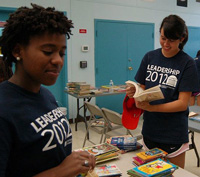Those who have risen to leadership positions in University of Virginia student organizations are learning how their groups fit into the bigger picture of University, and the community.
On Friday, student leaders participating in the Leadership 2012 program will complete five-week internships, an extension of the on-Grounds program that took place in late May through early June, in which 34 students came together for six days to learn what it means to be a leader at U.Va.
Each year, the Office of the Dean of Students invites leaders of major University-wide organizations from the Honor Committee to the Inter-Sorority Council to the Asian Student Union to attend the Leadership 2012 program. Held each summer, "L2K" seeks to give participants a fuller sense of where they and their organizations belong in the University community.
L2K was founded in the early 1990s as a leadership development program. Employing multiple guest speakers, workshops and a group service project, it focuses on enhancing leadership skills, extending University connections and fostering a sense of community among student leaders. The core program lasts one week, while several participants – those who represent organizations most closely tied to self-governance and require the most time and guidance preparing for the coming academic year – continue with a five-week internship that helps them prepare and plan their organization's goals for the fall.
Students can become narrowly focused on their own organizations, said Nicole Eramo, the associate dean of students who directs the program. "L2K seeks to broaden their senses and helps them to see where their organization fits in, what other organizations are doing and how they can help each other reach their goals," she said.
A large part of L2K is networking with other student leaders. "Getting to know one another helps organizations to collaborate in the future," Eramo said. "It broadens students' vision beyond their sole organization."
Rising fourth-year Charity Harrell, the University Judiciary Committee's vice chair for first-years, said L2K helps student leaders become more community-minded.
"At U.Va. we don't cross our organizations enough," she said. "There's not enough dialogue between organizations. We may have different on-the-ground problems, but we all share the same broader goal of making U.Va. a better place."
L2K also helps student leaders realize the impact their organizations have on the University community and the entire student body. Frances Russell, a rising third-year and vice chair of both the University Guide Service and the Alcohol and Drug Abuse Prevention Team, said that it is easy to forget how influential an organization can be. "Many leaders think about how their decisions will affect their organization, but it is also important to consider how those decisions affect others outside the organization," she said.
One of L2K's main purposes is to provide students with the skills and support to handle the responsibilities that come with student self-governance. The Office of the Dean of Students invites student leaders based on who they think would benefit the most from the opportunity, particularly targeting those involved in organizations that assume a major role in self-governance, such as members of the Honor Committee or Student Council, Eramo said.
"We place a lot of trust and authority in our students," Eramo said. "When you're a student leader, you're really kind of an example and mentor as well as a steward of self-governance."
As safeguards of self-governance, student leaders should "pay it forward," Eramo said, by embodying leadership values and setting an example for upcoming leaders as well as for the wider community.
In this spirit, L2K dedicates a day for community service. This year, participants worked with City of Promise, painting fences and clearing yards in Westhaven, a low-income, public housing neighborhood managed by the Charlottesville Redevelopment and Housing Authority.
Although L2K and the internships are now over, Harrell says that leadership is a constantly developing skill. She hopes to use what she learned to increase UJC's transparency and to collaborate with the leaders of other organizations. "There's always more to learn and people to learn from."
Media Contact
Article Information
July 5, 2012
/content/through-l2k-student-leaders-make-connections-gain-broader-perspectives

